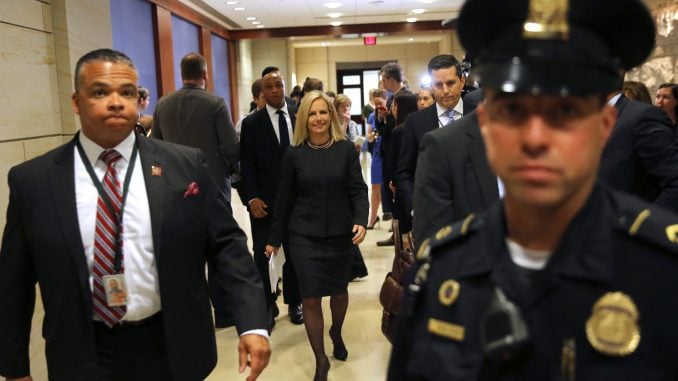
WASHINGTON, D.C. – Senior Trump administration officials warned Congress on Tuesday of ongoing efforts by Russia to interfere in the 2018 midterm congressional elections as the federal government prepares to hand out $380 million in election security funding to states.
At a briefing attended by about 40 or 50 members of the 435-member U.S. House of Representatives, the heads of FBI, Homeland Security Department and the director of National Intelligence told members to urge states and cities overseeing elections to be prepared for threats.
DHS Secretary Kirstjen Nielsen told reporters she agreed Russia was trying to influence the 2018 elections.
“We see them continuing to conduct foreign influence campaigns,” Nielsen said, but added there is no evidence of Russia targeting specific races.
Nielsen said DHS is watching other countries that have the capability to influence U.S. elections, including China and Iran. “We need to be prepared,” she said.
Chris Krebs, a senior cybersecurity official at the DHS, told Reuters in an interview that he expected $380 million approved by Congress in March to help safeguard U.S. voting systems from cyber attacks to be distributed to states later this week.
DHS is assisting 48 states with election security, including North Carolina, and handed out a chart at the briefing that said states need to have auditable systems, spend time on planning, training and drills and they should “consider investing in full system architecture reviews.”
Representative Michael McCaul, who chairs the House Intelligence Committee, said after the briefing that members are concerned that “not only Russia but possibly other foreign adversaries are now going to start looking at how they can meddle in the midterm elections and we need to be prepared. We were caught off guard last time.”
U.S. intelligence agencies have concluded that Russian leadership at a very high level was involved in the attempt to interfere in the U.S. election in order to boost President Donald Trump’s candidacy.
Russia has denied interfering in U.S. elections.
DHS has said that 21 states had experienced initial probing of their systems from Russian hackers in 2016 and that a small number of networks were compromised, but that there remains no evidence any votes were actually altered. N.C. was not one of the 21 states targeted by Russian hackers.



